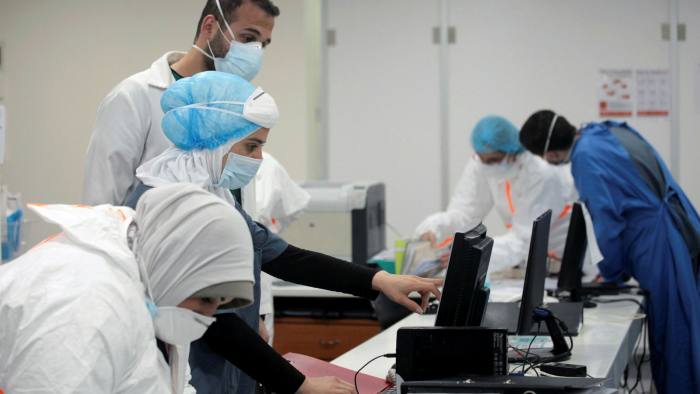
The number of COVID-19 deaths has increased by 50 times since the Beirut port explosion—compared to the total number of deaths recorded in the first six months of the pandemic. These numbers should be a wake-up call for the country’s leaders to invest in public health if they want to avert future health crises, says Project HOPE.
“The COVID-19 pandemic has revealed major deficiencies within the health care sector in Lebanon,” says Rabih Torbay, CEO and President of Project HOPE. “By not investing in its public health system, Lebanon is struggling to meet the demands and needs of the population during a pandemic, and as a result, lives are lost every day.”
Lebanon’s health system is predominantly private, with more than 80% of the country’s health budget directed toward private institutions. Some of these private hospitals have yet to receive COVID-19 patients, according to local reports.
As of February 1, 2021, Lebanon’s COVID-19 death toll exceeded 3,100—with a 7-day average of 110 deaths. Since the Beirut port explosion on August 4, 2020, the numbers of cases and deaths have increased alarmingly, causing significant strain on hospitals and frontline health care workers. In January 2021 alone, Lebanon recorded 1,627 deaths related to COVID-19. This is more than the total number of deaths—1,455—recorded in 2020, according to Lebanon’s Ministry of Health.
For several weeks, hospitals in Lebanon have been operating beyond capacity and in some cases, treating patients in parking lots. Shortages of oxygen and ventilators have been widely reported. Doctors and nurses have been working around the clock, often without adequate and sufficient equipment.
“The COVID-19 pandemic and the port explosion have taken a severe toll on frontline health care workers. Not only are they dealing with the pain of a traumatic event, but they are also left to make life and death decisions they should not have to make,” says Torbay.
“We were unprepared, uninformed, confused and trying to learn from other countries in how to deal with the COVID-19 situation, and then the blast happened,” a doctor from Karantina Hospital in Beirut told Project HOPE. “It was the worst moment of my life, even though I grew up in Lebanon during the civil war. This situation was something completely different. It was like the apocalypse.”
Project HOPE calls on Lebanese authorities, international donors, and aid organizations to prioritize investments into the public health sector to strengthen its capacity in order to resist future shocks, and to significantly invest in the protection of health care workers. “Health care workers are the backbone of Lebanon. They must be offered better protections. This includes better working conditions, as well as being paid fairly and on time for the work they are doing,” says Torbay.
Facts and Figures
- More than 2,400 health care workers have been infected by the virus in Lebanon.
- Intensive Care Units (ICU) are between 80% -100% capacity across the country, according to the World Health Organization.
- On January 16, 2021, Lebanon signed its final deal for 2.1 million doses of the Pfizer-BioNTech vaccine. The vaccines are due to start arriving in batches in February 2021.
- Lebanon also signed up for 2.73 million doses through COVAX.
- Last week, Lebanon’s Ministry of Health unveiled its vaccination strategy and indicated that the country seeks to inoculate 80% of the population by the end of 2021.
- The World Bank Group’s Board of Executive Directors approved a US$246 million new project to provide emergency cash transfers and access to social services to approximately 786,000 poor and vulnerable Lebanese. It also approved a re-allocation of US$34 million under the existing Lebanon Health Resilience Project to support vaccines for Lebanon.
Following the Beirut port explosion, Project HOPE has partnered with the Rene Moawad Foundation(RMF) Lebanon to provide trauma care and psychosocial support. Till this day, it continues to provide immediate assistance through the procurement and distribution of medicines, medical supplies, disaster health kits and PPEs. It has also provided two financial grants to health centers for sexual reproductive health care and psychosocial support to most vulnerable populations—in particular women and children. So far, Project HOPE has supported more than 10 hospitals in Beirut, 12 public health centers and several local INGOs, reaching more than 70,000 health workers and people in need and affected by the blast.
About Project HOPE
Project HOPE is a global health and humanitarian relief organization that is committed to placing power in the hands of local health care workers to save lives across the globe. Read more here.
RELIEF WEB


Leave a Reply
You must be logged in to post a comment.